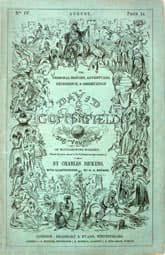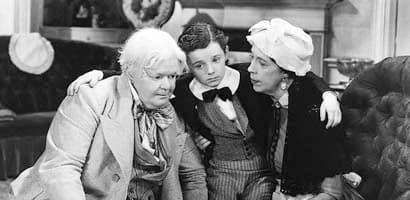David Copperfield
Critique • Text • At the movies
 Serial, 1849
Serial, 1849Original title
The Personal History, Adventures, Experience, and Observation of David Copperfield the Younger, of Blunderstone Rookery
Also known as
The Personal History of David Copperfield
First publication
1849–1850 in instalments
First book publication
1850 in two volumes
Literature form
Novel
Genres
Literary, buildungsroman, autobiographical novel
Writing language
English
Author's country
England
Length
Approx. 357,000 words

Young Freddy Bartholomew pulls the veteran cast together in David Copperfield.
Classic David Copperfield
David Copperfield (1935): Also known as The Personal History, Adventures, Experience, & Observation of David Copperfield the Younger; film, 129–133 minutes; director George Cukor; writer Hugh Walpole, Howard Estabrook; featuring Freddy Bartholomew, W.C. Fields, Edna May Oliver, Basil Rathbone, Lionel Barrymore
Numerous adaptations have been made of Charles Dickens's most autobiographical work, the best to my knowledge being the BBC miniseries of 1999 with Daniel Radcliffe, the future Harry Potter, as young David.
But for a long time, before we got long-form treatments, the 1935 black-and-white Hollywood movie with child star Freddy Bartholomew in the title role was considered the classic version of David Copperfield—and for good reason.
Compressed but grand Dickens
Originally released as The Personal History, Adventures, Experience, & Observation of David Copperfield the Younger, George Cukor's 1935 movie also features Edna May Oliver as the eccentric aunt Betsey Trotwood, Basil Rathbone as the cold-hearted Murdstone, and comedian W.C. Fields, whose blustery, ne'er-do-well persona perfectly fits Mr. Micawber.
Not to mention Lionel Barrymore, Elsa Lanchester and Maureen O'Sullivan. Plus more great British actors than you can shake a cane at, brought in to play all the quirky characters.
In fact, so many prestigious actors are enrolled from MGM studios for the supporting roles that the two actors who play the lead, David Copperfield, are listed way down in the credits at the beginning.
When I first saw this film, I thought a weak spot was a bland Frank Lawton as the adult David, who appears almost exactly halfway through the nearly two-and-a-half-hour movie, just as he does in the novel.
But a second viewing made it clear to me Lawton's performance is quite appropriate and seems flat only because he has the thankless task of following Bartholomew who shines in the first half as young David. Also Lawton's section of the narrative is just less dramatic and more conventionally romantic.
As with Dickens's story, the first part of the movie is an emotional powerhouse and young Bartholomew emotes most effectively. He's endearing without being cloying, playing like a veteran off Rathbone, Fields, and especially Oliver, who steals every scene she's in.
W.C. Fields and Freddy Bartholomew hit it off in classic, condensed David Copperfield.
Director Cukor's David Copperfield is a marvel of compression. It is difficult to think of a single plot point that is missed, especially in the first half. There are actually many parts of the novel that are skipped, but when you're watching the film, you notice no seams. The creative cinematography moves the story ahead at a delirious pace, yet without seeming to rush.
The second half leaves out more narrative twists but, you know, we don't need them. In the novel Dickens is trying to move in different directions from the first half and then he has to tie up all the loose ends. He does this very well, but perhaps this film does it better for a modern, less patient audience.
After a long wait, it was finally released on DVD a few years ago. Watch it to whet your appetite—and for the pure theatrical enjoyment of it.
Some consider this the best Dickens adaptation ever. It may be the most entertaining, except perhaps for a couple of the Christmas Carol films. But this may be the case more for those who haven't read the novel, or for those who have read the novel and just want to recall what it was about.
It's brilliant filmmaking. But if you want Dickens with all the details and nuance, you'll have to look further. Perhaps settle in with the 1999 series for the more enveloping Dickensian experience.
— Eric

